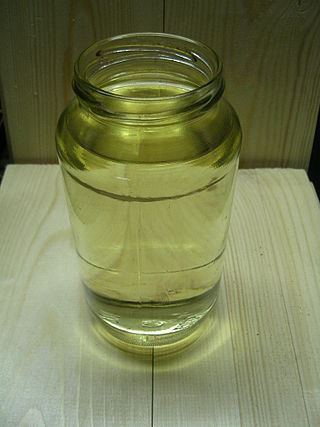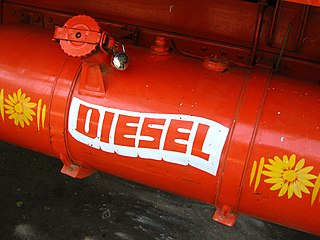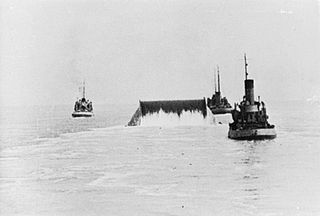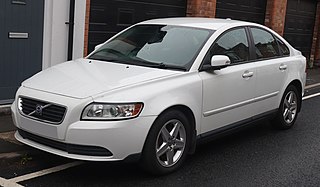
Gasoline or petrol is a transparent, petroleum-derived flammable liquid that is used primarily as a fuel in most spark-ignited internal combustion engines. It consists mostly of organic compounds obtained by the fractional distillation of petroleum, enhanced with a variety of additives. On average, U.S. refineries produce, from a barrel of crude oil, about 19 to 20 gallons of gasoline; 11 to 13 gallons of distillate fuel ; and 3 to 4 gallons of jet fuel. The product ratio depends on the processing in an oil refinery and the crude oil assay. A barrel of oil is defined as holding 42 US gallons, which is about 159 liters or 35 imperial gallons.

Fuel injection is the introduction of fuel in an internal combustion engine, most commonly automotive engines, by the means of an injector. This article focuses on fuel injection in reciprocating piston and Wankel rotary engines.

A filling station, also known as a gas station or petrol station, is a facility that sells fuel and engine lubricants for motor vehicles. The most common fuels sold in the 2010s were gasoline and diesel fuel.

Diesel fuel, also called diesel oil, is any liquid fuel specifically designed for use in a diesel engine, a type of internal combustion engine in which fuel ignition takes place without a spark as a result of compression of the inlet air and then injection of fuel. Therefore, diesel fuel needs good compression ignition characteristics.
An octane rating, or octane number, is a standard measure of a fuel's ability to withstand compression in an internal combustion engine without detonating. The higher the octane number, the more compression the fuel can withstand before detonating. Octane rating does not relate directly to the power output or the energy content of the fuel per unit mass or volume, but simply indicates gasoline's capability against compression.

Operation Pluto was an operation by British engineers, oil companies and the British Armed Forces to construct submarine oil pipelines under the English Channel in support of Operation Overlord, the Allied invasion of Normandy during the Second World War.
Compressed natural gas (CNG) is a fuel gas mainly composed of methane (CH4), compressed to less than 1% of the volume it occupies at standard atmospheric pressure. It is stored and distributed in hard containers at a pressure of 20–25 megapascals (2,900–3,600 psi), usually in cylindrical or spherical shapes.

The Volvo S40 is a series of compact and mid-size automobiles marketed and produced by the Swedish manufacturer Volvo Cars from 1995 to 2012, offered as a more mainstream alternative to the Volvo S60 to compete in a lower pricing bracket. The S40 was more or less positioned against premium-leaning small family cars like the Volkswagen Jetta as well as some mass-market large family cars.

A Natural Gas Vehicle (NGV) is an alternative fuel vehicle that uses compressed natural gas (CNG) or liquefied natural gas (LNG). Natural gas vehicles should not be confused with autogas vehicles powered by liquefied petroleum gas (LPG), mainly propane, a fuel with a fundamentally different composition.

Rationing was introduced temporarily by the British government several times during the 20th century, during and immediately after a war.

The Mercedes-Benz W140 is a series of flagship vehicles manufactured by Mercedes-Benz from 1991 to 1998 in sedan/saloon and coupe body styles and two wheelbase lengths. Mercedes-Benz unveiled the W140 S-Class at Geneva Motor Show in March 1991 with sales launch in April 1991 and North American launch on 6 August 1991.

Aral AG is a German oil company established in 1898 as Westdeutsche Benzol-Verkaufs-Vereinigung GmbH. The company is currently owned by British conglomerate BP after it was purchased in 2002.

Autogas or LPG is liquefied petroleum gas (LPG) used as a fuel in internal combustion engines in vehicles as well as in stationary applications such as generators. It is a mixture of propane and butane.

Various alcohols are used as fuel for internal combustion engines. The first four aliphatic alcohols are of interest as fuels because they can be synthesized chemically or biologically, and they have characteristics which allow them to be used in internal combustion engines. The general chemical formula for alcohol fuel is CnH2n+1OH.

The aircraft diesel engine or aero diesel is a diesel-powered aircraft engine. They were used in airships and tried in aircraft in the late 1920s and 1930s, but never widely adopted until recently. Their main advantages are their excellent specific fuel consumption, the reduced flammability and somewhat higher density of their fuel, but these have been outweighed by a combination of inherent disadvantages compared to gasoline-fueled or turboprop engines. The ever-rising cost of avgas and doubts about its future availability have spurred a resurgence in aircraft diesel engine production in the early 2010s.

The SNR-300 was a fast breeder sodium-cooled nuclear reactor built near the town of Kalkar, North Rhine-Westphalia, Germany. The reactor was completed but never taken online. SNR-300 was to output 327 megawatts. The project cost about 7 billion Deutsche Mark. The site is now the location of a theme park, Wunderland Kalkar, which incorporates much of the power plant buildings into the scenery.
E85 is an abbreviation for an ethanol fuel blend of between 51% and 83% denatured ethanol fuel and gasoline or other hydrocarbon (HC) by volume.

The BMW Hydrogen 7 is a limited production hydrogen internal combustion engine vehicle built from 2005-2007 by German automobile manufacturer BMW. The car is based on BMW’s traditional petrol-powered BMW 7 Series (E65) line of vehicles, and more specifically the 760Li. It uses the same 6-litre V-12 motor as does the 760i and 760Li; however, it has been modified to also allow for the combustion of hydrogen as well as petrol, making it a bivalent engine. Unlike many other current hydrogen powered vehicles like those being produced by Hyundai, Honda, General Motors, and Daimler AG – which use fuel cell technology and hydrogen to produce electricity to power the vehicle – the BMW Hydrogen 7 burns the hydrogen in an internal combustion engine.
Biofuel is fuel that is produced from organic matter (biomass), including plant materials and animal waste. It is considered a renewable source of energy that can assist in reducing carbon emissions. The two main types of biofuel currently being produced in Australia are biodiesel and bioethanol, used as replacements for diesel and petrol (gasoline) respectively. As of 2017 Australia is a relatively small producer of biofuels, accounting for 0.2% of world bioethanol production and 0.1% of world biodiesel production.
The petroleum industry in India dates back to 1889 when the first oil deposits in the country were discovered near the town of Digboi in the state of Assam. The natural gas industry in India began in the 1960s with the discovery of gas fields in Assam and Maharashtra. As on 31 March 2018, India had estimated crude oil reserves of 594.49 million metric tonnes (Mt) and natural gas reserves of 1339.57 billion cubic metres of natural gas (BCM).















